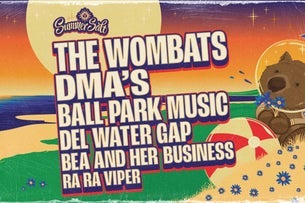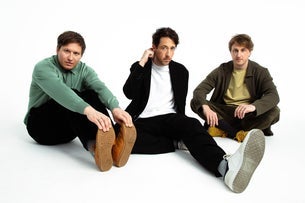'I Still Feel Like I'm In A Band That's Starting Out'
"It’s starting to freak me out now because we’ve been a band for 12 years, which is insane."

At the point of this chat, The Wombats vocalist Matthew Murphy is going through his paces, getting everything sorted to travel from Los Angeles to their next stop on their extensive US tour. “We’re playing at the Theatre tonight, and while I’m talking to you I’m just packing my bags and getting everything ready for the rest of the tour. I’m looking at my dog, who’s sulking.” He sounds like he needs a bit of a pick-me-up, but you can hardly blame him; since the release of their third album Glitterbug in April, it’s been non-stop touring, and given the high-profile status of the band, naturally, they’ve been gradually making their way around the world. It sounds exhausting, but Murphy and the band are used to it. It’s been four years since they released their second album This Modern Glitch back in 2011, but they haven’t stopped since the release of their breakthrough debut album, A Guide To Love, Loss & Desperation which was released in 2007. “I guess to the outside it looks like we’ve had a lengthy break, the reality is, it’s just been thinking about writing and the next album, really. I don’t feel like I’ve had any time off for the last 12 years. I’m still enjoying it though, so it’s fine!”
It was a difficult period around the time The Wombats released This Modern Glitch, with Murphy openly admitting he suffered from depression at that time; he alluded to it in single Anti-D from that album, which was about his experience on Citalopram. Moving forward, it’s become extremely important for Murphy to continue looking ahead instead of focusing on the past, another reason Glitterbug has a perkier vibe. “I try not to reflect and over-analyse the past — you just need to keep looking forward. Dwelling on the past can send you into a negative space, so I’ve always concentrated on the future and the good things still yet to happen.” Each of their albums has had a song surrounding the concept of growing up and how nerve-racking it can be as a young person, and Murphy acknowledges writing those songs are an important aspect in regards to keeping himself grounded and recognising where he stands at this point in life. “I guess it’s just born out of frustration and the feeling of when I was prepubescent,” Murphy acknowledges of tracks School Uniforms, 1996 and Emoticons. “I didn’t have to think about mortgage repayments and that sort of thing. Everyone has an existential crisis about maturing and whether they’re doing it correctly or incorrectly.”
"Everyone has an existential crisis about maturing and whether they’re doing it correctly or incorrectly.”
He still struggles to believe he, drummer/percussionist Dan Haggis and Norwegian-born bass player Tord Overland Knudsen have been jamming together since close to the beginning of the millennium. “It’s starting to freak me out now because we’ve been a band for 12 years, which is insane, so it’s definitely kind of nuts. Some days I feel like I’m still in a band where we’re still starting out and trying to get somewhere, and others I feel like I’m in a solid, established band, and it just keeps going back and forth.”
Don't miss a beat with our FREE daily newsletter
That idea is obvious when listening to Glitterbug through — it’s been somewhat a case of reconnecting with their roots for The Wombats, and the new album is certainly more reminiscent of their first record than their second. That said, there is also no denying the trio have evolved in terms of their sound as well. It was not necessarily the plan to reassess ahead of the third album (as mentioned, the band don’t have time to think about it too much), when it comes time to knuckle down, the band ultimately decided they were at their best when they were bright, bubbly and full of energy in their approach and delivery. “Sound-wise, it was a pretty organic process, but with the songwriting, I wanted it to have more of the qualities of our first album in terms of how vivid and colourful it is. I think our second album might have been a bit too moody, and we had to find the correct balance between our first and our second, and I think in terms of our song writing we nailed the balance on this album.”
“You only get one chance to do a third album or a fourth album so essentially it always kind of feels like your debut album, and you’re always trying to do something a little different from the last. And I guess as you progress, you have stronger and more vivid ideas of what the album should sound like, which is what we all agreed on; we think there were a few times where we had to debate it out, and that was the most challenging part.”
"Turning three individuals into one collective was challenging.”
Grounding their sound once again meant it was an easier task piecing the songs together and creating an end product they were completely pleased with, something that Murphy explains he struggled with on This Modern Glitch. Despite the initial geographic displacement of the trio, which saw Knudsen and Haggis creating backing tracks in Liverpool to send to Murphy which he would build upon in LA or London, the vocalist believes that while it was a challenge, it did help him with writing the record. “I kind of found this album was probably slightly easier to write, or I didn’t feel like I had to churn out song after song. We just went for quality over quantity, we didn’t force–” Murphy recants, “Well, actually, I forced a lot of things, but I didn’t force it as much as the second album. I think this one, the challenge was recording it really, and everyone getting on the same page, you know, turning three individuals into one collective was challenging.”
While there are plenty of bands out there who choose to neglect, or in the most dramatic of scenarios, reject the songs that got them to where they are today, Murphy assures that he and the band won’t be the kind of people to act in that manner, and it’s appropriate considering what has become of Glitterbug — it’s all about enjoying oneself on stage and making sure the fans are having as much fun as possible. “It’s weird, I’ve heard bands describe their more commercial stuff as sort of singing karaoke, but I’ve never really had…” Murphy pauses, “Whenever we play Let’s Dance To Joy Division or Moving To New York, I’m still really happy playing those songs to people and we know we’re going to garner a good reaction from the people and the crowds — it gives us something to work with. In that respect, we don’t get bored of them at all.”
The band are coming down for Splendour In The Grass very soon, but they’ve also done their best to cover as much of the country as possible with headline shows of their own. Murphy particularly digs the anything-can-happen vibe of the festival scene. “They’re both different beasts. I love festivals because you never really know what’s going to happen, what the audience is going to be like. People generally go wilder at festivals; that’s not to say they don’t go wild at our own shows, but the atmosphere is more unified and it’s like, ‘Right, we’re here for three days, let’s make the most of it and get absolutely retarded and just go nuts.’”
Related Gigs












